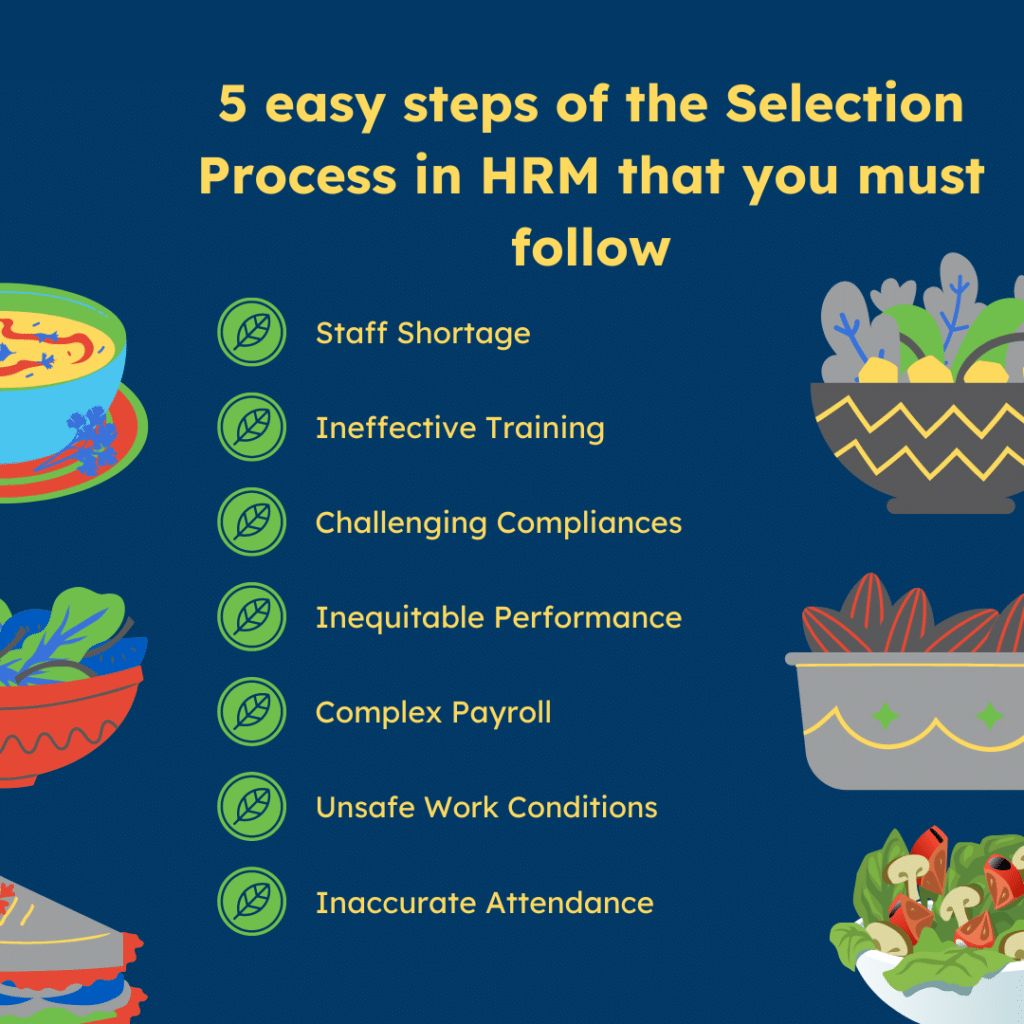Being a customer-centric industry, working in the restaurant sector is hectic for the employees and their HR department. Managing employees in this sector require additional efforts from HR and the management due to the nature of the work being undertaken. As a result, HRs face multiple challenges while managing their employees effectively.
The typical HR challenges range from limited options to properly engage the employees to having inadequate face-to-face time with the staff to provide performance-related feedback. The fast-paced nature of the industry, coupled with the hectic work environment and the customer-centricity of the job, leaves the employees with less time for anything else.
Hence, we are sharing seven of the most common HR issues in restaurants and the benefits of deploying HR software to remediate those issues.
Relevance of HR in the Restaurant Business
The duties of the human resources department are often relegated to hiring and firing in the restaurant sector. Even employee payroll is handled solely by the accounts team in most restaurant chains. As a result, the significance and effectiveness of HR are significantly reduced.
However, the restaurant sector also bears the brunt of this negative attitude towards their HRs. Often, the employees are unhappy with their jobs, leading to higher turnover. Additionally, there are various other issues plaguing the industry due to the mismanagement of the HR department, such as:

Staff Shortage
Staff shortage in companies is not new. However, the restaurant industry’s lack of talented staff is especially alarming. Highly skilled teams are in demand in any industry, and the same is true with the hospitality sector in general. However, finding and retaining qualified staff has become more of a challenge nowadays.
Companies deploying modern tech-based solutions, such as Applicant Tracking Systems (ATS), can scour and recruit talented employees. Hence, restaurants that do not apply modern technology are bound to lose qualified staff to more tech-savvy restaurants. Additionally, retaining talented employees is also a challenge for the HR team, as they get limited interactivity with the employees and ineffective onboarding.
Ineffective Training
With the fast-paced work of the restaurant industry, HRs are often left with little to no time for training their employees. Combined with the shortage of talented staff, inadequate training might even lead to loss of business as it is a very customer-centric sector. If the training is insufficient, the employee may not be able to perform their duties well. Consequently, the goodwill of the restaurant might suffer, which is detrimental to any business.
Inadequate training is a significant issue in the restaurant industry since employees are required to interact with customers. Additionally, it also hampers their efficiency and, consequently, their productivity. Furthermore, it is challenging to authenticate the claims made by employees regarding their efficiency during their interviews, which makes it challenging to assign the correct training to them.
Also Read: 7 Advantages of Best HR Practices for Restaurants
Challenging Compliances
There are various regulatory compliances to take care of when employing individuals at any institution. Failing to comply with any one of these rules and regulations might result in heavy penalties, such as expensive fines. However, the risks are more for the restaurant business as non-compliance might lead to the cancellation of restaurant permits.
A complex set of licenses is required to open a restaurant, such as an FSSAI license, health/trade permit, eating house license, etc. The restaurant must also acquire the permits to employ staff and abide by the regulations to pay their salaries and deduct their taxes on time.
Inequitable Performance
Being a customer-centric sector, performance management should be fair towards the employees. However, measuring the employees’ effectiveness and performance is not always easy as it boils down to the customer experience. While it might be easier to gauge someone based on their performance behind the scenes, measuring them based on their customer interactions is challenging.
Restaurant owners should also be wary of unintentional discrimination against various minority classes and oppressed communities. Even accidental prejudice towards any sect by an employee may lead to dire consequences for the business. Hence, one must ensure that the staff are trained to handle all situations and refrain from unfair practices.
Complex Payroll
Payroll calculations in the restaurant sector are extremely finicky due to the different kinds of employment involved. Adding tips and overtime wages to the mix increases its complexity further. Since employee taxes must be calculated based on their salaries, a complex system makes it challenging for HRs to undertake simple payroll calculations and timely disbursements.
Other issues with employee payroll are the numerous benefits that are not uniform across the industry. Such differences further increase the complexity of disbursing employee wages. It could prove harmful for the business if the employees’ salaries are delayed due to a delay in wage calculation.
Unsafe Work Conditions
Since restaurant staff are required to handle food preparation, there is always the potential to have accidents such as food spills, physical hurt, and fires. Hence, the employees should be trained to avoid such situations and tackle them should they arise when they are working. Also, restaurants should maintain proper sanitisation to ensure that the food remains fresh and consumable.
To ensure the safety of the restaurant and its employees and customers, one needs to ensure that safety protocols are always followed. Hence, the HRs need to train their employees on the relevant protocols and ensure that the premises are sanitised to avoid any safety and health issues.
Inaccurate Attendance
Employee attendance is another major challenge for the HR department due to the different kinds of employees working in a restaurant. There are various parameters to consider, including break-shifts, overtime, tips, and more specific to the hospitality sector. Any mistake in recoding the times could result in significant issues with staff salary.
Additionally, time theft is common in restaurants due to inefficient techniques used to register working hours. It is essential to curb any malpractice concerning attendance, as it could lead to over-payments and more clerical tasks for the HR and accounting departments.
HR issues in Restaurants resolved with Software
HR software has revolutionised employee management for the HR department. The HR of restaurants can also benefit from deploying robust HR software that streamlines their administrative tasks and improves efficiency. Let us understand the various benefits of HR software for restaurants:
Streamlined Scheduling
Scheduling the various shifts of the restaurant staff is one of the most hectic tasks for the HR team. Creating effective employee shift schedules that take care of efficiency without overstaffing the shift is a delicate balance that should be maintained to maximise profits.
Deploying an HRMS takes care of staff scheduling by automating the process for maximised efficacy. Using this software, HR managers can align the workforce requirements with employee availability, streamlining the process for everyone involved.
Optimised Recruitment
Recruitment in restaurants has been challenging traditionally. The legacy hiring process usually includes shortlisting candidates with multiple emails or meetings manually. Additionally, the onboarding process is typically rushed to ensure that the employee starts being productive as soon as possible.
However, with a dedicated HRMS, recruitment can be further streamlined by creating a centralised talent pool and an ATS that can shortlist candidates within minutes based on custom-defined parameters as per the vacant position. Moreover, employee onboarding can also be streamlined with the help of a robust HRMS, as the employees can complete their onboarding remotely with the use of technology.
Compliance Automation
Modern HRMS are deployed on the cloud; hence, they are kept up to date with the latest workplace compliances by the software vendor. As a result, the HR department need not spend their time and effort keeping up to date with the changes in the rules and regulations. Moreover, any required compliances would already be implemented in the software as checks whenever needed, ensuring that the restaurant always remains compliant with local laws.
Secure Database
With the added security of the cloud database, the employees’ information remains safe and secure. The employees can also update it for maximum accuracy. As a result, the company can collate the necessary information and take strategic decisions based on the data.
Most cloud-based HRMS also controls user access, providing data abstraction and enhancing the system’s security. Moreover, the database is encrypted with adequate backups to ensure that the company and employee information remains secure while being accessed by authorised users.
Enhanced Engagement
With cloud processing, employees can have their data at their fingertips whenever required. Most cloud-based systems also provide a dedicated mobile app to simplify the process. Employees can undertake various tasks using the mobile app, such as applying for leaves, checking company policies, downloading payslips, etc.
All these factors make the employees feel empowered. They can also check their upcoming shift schedules and request changes if required. Their supervisor can also quickly accept or reject these requests, making the process more streamlined. It also reduces the scope of errors and makes communication easier.
Conclusion
The HR department in restaurants requires a robust HRMS to undertake its tasks with utmost efficiency. The common issues discussed in this blog can be quickly remediated by deploying a cloud-based HRMS solution. Additionally, it saves the time and effort in undertaking daily tasks of the HR department, which gives them more time to strategize employee engagement activities, develop a better employer brand and retain talented staff for longer.








